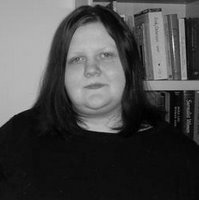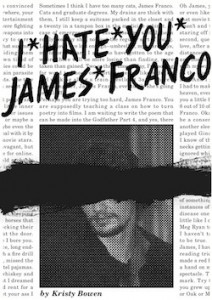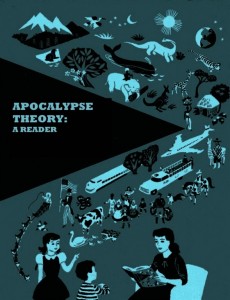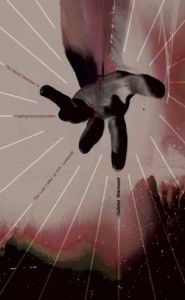Cherie Caswell Dost
 Kristy Bowen is a prolific Chicago poet and artist who has published several full-length books of poetry, such as girl show (black Lawrence Press, 2013) as well as multiple chapbooks, including Apocalypse Theory: A Reader (SFSU Poetry Center Chapbook Exchange, 2013) and I*HATE*YOU*JAMES*FRANCO (sundress publications, 2012). She founded dancing girl press in 2004 and she is the editor of the online lit-zine Wicked Alice.
Kristy Bowen is a prolific Chicago poet and artist who has published several full-length books of poetry, such as girl show (black Lawrence Press, 2013) as well as multiple chapbooks, including Apocalypse Theory: A Reader (SFSU Poetry Center Chapbook Exchange, 2013) and I*HATE*YOU*JAMES*FRANCO (sundress publications, 2012). She founded dancing girl press in 2004 and she is the editor of the online lit-zine Wicked Alice.
Bowen’s poetry is filled with the surreal, smashing history and language into finely-tuned meditations on identity and dark humor. We met in her studio in downtown Chicago, in the historic Fine Arts Building, where a uniformed elevator man still closes the accordion gate, and personally delivers you to your floor.
Monkeybicycle: Congratulations on the tenth anniversary of dancing girl press. Has running a press helped you navigate the poetry world?
Kristy Bowen: Definitely. Spending a lot of time immersed in other people’s work makes me a better poet—it’s always a source of inspiration. It’s like spending all your time in a painter’s studio: even if the work is not yours, you’re still surrounded by paint, and you’re going to pick up things, and have your own ideas while doing it.
It also makes me aware of how much great work is out there. I don’t feel so bad when I send things off and they don’t accept it, because I know I am competing against all kinds of good work. I don’t feel like its personal, you’ve got to know that there’s just one spot.
MB: And now you’ve done over 200 chapbooks, do you feel like you have a succinct description of what you are looking for?
KB: Probably not. People always surprise me. In the guidelines in the beginning, the only thing I didn’t want to see was rhyming, but then actually Eva Schlesinger, a local poet, sent all rhyming poems—but they were very strange rhyming poems—and I thought, well there goes that definition out the window!
Every time submissions are open, it pushes the envelope just a little bit further. In the last year, we had a book of zombie poems, and a book of Buffy poems—and I’d been looking for that Buffy book for a while! I had received some things that weren’t good enough, so I was so excited we got take this one on. Every editor has their own pet interests. If you have a manuscript of quirky little poems, its key to find that editor who is into the same things you are. Then you’re golden.
MB: You were in grad school when you started your own press. You didn’t wait to find validation anywhere else, you found validation within your own tastes and ran with it . . . is it that easy?
KB: Other editors say this too: you start out and you don’t know what you’re doing. I had been running wicked alice for a while, so I kinda knew what I liked and what I was drawn to, but I really didn’t know what I was doing. You’re just making it up as you go along, and then at some point, someone actually takes what you are doing seriously, and then it’s like, wow, maybe I’m a real editor.
It’s permission—I think you just need to take it—when I just started the press I was doing my MFA at Columbia, and people were like: “how can you do that?” and I said “Oh I just did it!” Everyone seemed reluctant to take that control. You can wait around forever for someone to give you that permission and you may never get it. I am happy when I see young poets take the control, cause you just got to do it.
MB: So how does a poem happen for you?
KB: I tend to . . . and this has changed since I began writing—I used to sit down and say I am going to write a poem about xyz and then just write the poem. But it changed in the last ten years because I’ve been doing more visual arts, more collage, and the writing has become more collage-like. My day job is at a library, so I always have little card catalog cards that I’m writing on, and at some point, I sit down and start putting those together and a poem sorta comes. It’s more of a discovery process than it used to be.
MB: And your texts and your images, do they talk to each other?
KB: They do, but sometimes not right away. Sometimes I do a series of poems OR a series of collages. I am trying to do it together more and more now.
MB: You’ve had so many inspirations for your art and poetry: from the boxes of Joseph Cornell, to the the history of the carnival/circus sideshow/peepshow, to popular culture too, like your chapbook, I*HATE*YOU*JAMES*FRANCO.
 KB: That one started out where I was not even taking it seriously. I would talk to my friends at the Library— “What do you think of James Franco? What can we say about James Franco? ”—and it was just a fun thing. Then I realized I had six or seven pieces and I thought, oh, maybe this is a poem, and then it became not really about James Franco, it became more about writing itself, and celebrity, and the anxieties you have as a poet. I saw then, oh, this is about a real concept, it’s not just me goofing off and blogging.
KB: That one started out where I was not even taking it seriously. I would talk to my friends at the Library— “What do you think of James Franco? What can we say about James Franco? ”—and it was just a fun thing. Then I realized I had six or seven pieces and I thought, oh, maybe this is a poem, and then it became not really about James Franco, it became more about writing itself, and celebrity, and the anxieties you have as a poet. I saw then, oh, this is about a real concept, it’s not just me goofing off and blogging.
I started reading your Wikipedia page, James Franco, and frankly, have decided this is more about me than it is about you. Only one of us makes it out of this alive. I talk tough, but really I’m a peach. Most men who call me honey or sweetie or sexy are really either lying to me about something or trying to get me in the sack. You seem like the kind of guy who calls waitresses and receptionists “Hun”. Don’t be that guy. Also don’t be the sort of guy who writes poems based on the Fibonacci sequence. I am trying not to be the sort of girl who writes too many poems about birds and mermaids. I am trying not to be the girl who falls in love with every guy who makes me laugh or feel pretty or pays me a particular, sustained sort of attention. I am also trying not to be the sad girl crying into her sweater on the train ride home.
KB: And it was so easy to write! Sometimes its like torture, like pulling something out, but I’m trying to do more things where you fool yourself into thinking you’re not actually working, and yet be working. More like playing, but you have an end product. I don’t want it to feel like work.
MB: You have such humor in your poetry, but real darkness too, do you balance that?
KB: I used to joke that I had one funny poem. It was about TV movies-of-the-week and it name-checked Meredith Baxter-Birney and her perpetual role as a victim. Now I have written more, but there is always a struggle. Kathleen Rooney (editor of Rose Metal Press) said on a panel recently, there are different kinds of humor, and the best humor is funny-sad.
MB: Do you think there’s something really special about the chapbook as a form?
KB: In my own readership, I tend to like the short. Sometimes a manuscript is the requisite 48 pages and it doesn’t need to be—like the good poems are maybe 20 pages and I can give a lot more bang for the buck with just those twenty pages than I can with all this fluff-filler. There’s this drive to get the full-length books out—especially if you are in academia—but I like the compactness.
MB: But also because you’re a artist and into book arts, is there something different about a chapbook as a object that you hold in your hands?
KB: Yes, and we try to play a little bit with that. We’ve done boxes, and a series of sheaths of papers, and we try to push that line between what is a chapbook and what is book arts. Also we have a limited budget, so the things I might like to do in terms of paper are not always possible.
MB: But at the same time, you don’t pooh-pooh the e-book!
MB: (laughter) I mean, you’re open to whatever forms are available!
 KB: Absolutely, we’ve thought about getting older physical chap-books online now. My new book, Apocalypse Theory: A Reader, is an e-chapbook through the e-chap repository at San Francisco State University. It’s a collection of chapbooks that growing all the time.
KB: Absolutely, we’ve thought about getting older physical chap-books online now. My new book, Apocalypse Theory: A Reader, is an e-chapbook through the e-chap repository at San Francisco State University. It’s a collection of chapbooks that growing all the time.
MB: But it’s curated?
KB: Yes, they invite people to submit and it’s growing. I’ve gotten really into the e chapbook, because a physical chapbook, your audience is limited to who can purchase it. But the editor of Sundress Publications (who published James Franco poems as an e-chap) said they’d had 4000 downloads, and I said “That’s more people reading my poems than ever before!”
MB: But what about the question of commerce?
KB: Right, there’s no monetary compensation in e-chapbooks and, as an artist, do you expect to get paid for your work? We actually pay our authors in copies, but at some point, if we are more financially solvent, I would love to pay our authors past royalties, etc.
MB: But is freedom the flip-side of that?
KB: You don’t have to think about whether this book is gonna make money. With newer poets, you might be taking a risk publishing their first work, but that’s okay, we can put it out anyway. We’ve had a lot of poets where it’s their first chap, and then three or four years down the line, they publish a full-length and suddenly there is this swell of interest in their work and the chapbook starts selling. So you never know what is going to happen.
MB: You always have a strong voice in your poetry, but never a single voice, more of a multiple voice. Do you feel like you have many voices?
KB: I feel like its several voices—this voice in apocalypse theory is certainly different than the voice in girl show or I*HATE*YOU*JAMES*FRANCO. I started out writing sonnet poems, so I was used to working with different voices from the beginning. There are very few poems that are actually me.
My apocalypse theory and I have a baby we name “fortune.” Our baby has a goat’s head and faints when we say “Boo.” Fortune whinnies all night and eats through the cotton pillowcase three different times. We keep leaving him in the cereal aisle at the Winn Dixie, but he always finds his way back to us, scraping at the motel room door with his tiny cloven feet. My apocalypse theory covers his ears and rolls over. Fortune chews through the bedspread and licks the wallpaper clean off the wall.
MB: Do the voices surprise you sometimes?
KB: Definitely. You discover things about yourself and you also make up things about yourself. Those fictions become telling. They tell about your obsessions and what you’re trying to cover up.
MB: So what’s in your head right now, vintage postcards, zombie bunnies?
KB: I’m working with Dusie Kollectiv on a chapbook for AWP in Seattle. I am half-way through a series of poems about Cold War underground houses. The pictures are so weird to me—it’s like the Brady Bunch house, but underground.
MB: Are you doing images with that chapbook?
KB: I will draw in some housing plans of the underground houses. I did research about the 1965 World’s Fair and they had an exhibition of underground houses. So I am using the text from the brochures about how awesome it is to live underground. I grew up in the 80s and Russia was still the bad guy, so the fear has been ingrained into my psyche: What would it be like to be at the end of the world and be living underground? Hopefully I will finish it in time for AWP.
Submissions to dancing girl press are open every May through September. More information about Kristy Bowen can be found at kristybowen.net.
The interview was conducted by Cherie Caswell Dost, a Chicago poet, writer, and former contributor to Chicago Public Radio. She just completed a novel, The Letters of Betty Jo Rash.


